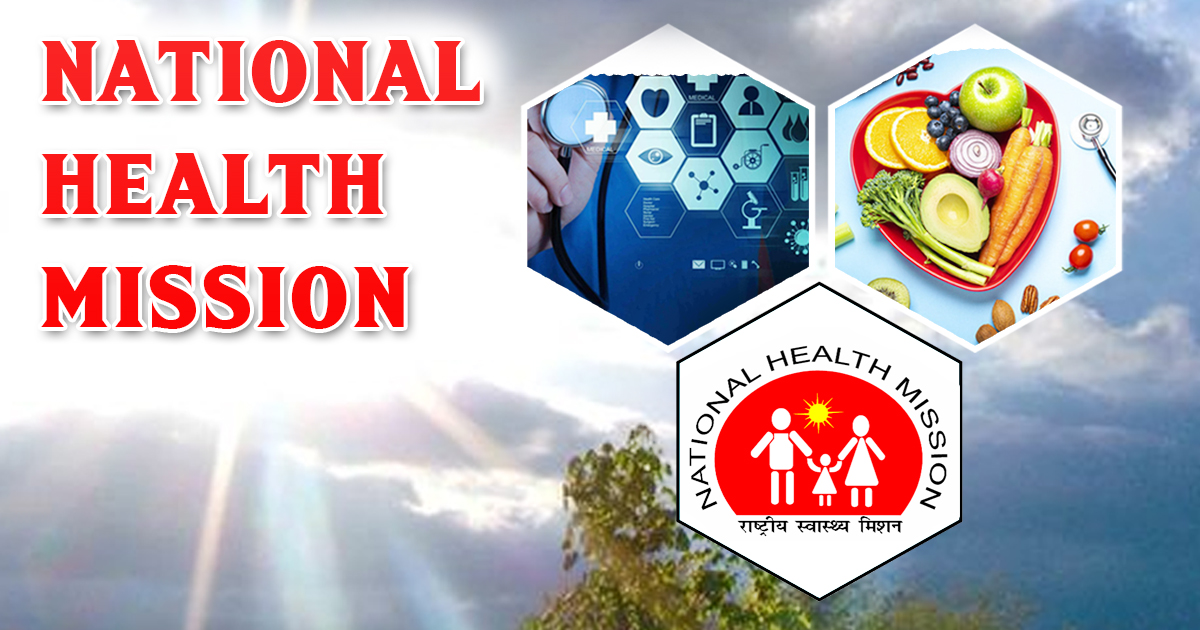
Introduction:
The National Health Mission (NHM) was launched in 2013 as an umbrella program to integrate various ongoing health initiatives under one overarching framework.
It aims to provide accessible, affordable, and equitable healthcare services to all citizens, especially those in rural and remote areas, as well as marginalized communities.
Objectives:
Reduce Maternal and Infant Mortality: NHM focuses on reducing maternal mortality ratio (MMR) and infant mortality rate (IMR) through interventions such as maternal and child health services, immunization, and nutrition programs.
Universal Immunization: Achieving universal immunization coverage against vaccinepreventable diseases is a key objective of NHM.
Prevent and Control Communicable Diseases: NHM aims to prevent and control communicable diseases such as tuberculosis, malaria, HIV/AIDS, and vectorborne diseases through targeted interventions.
Promote Health and Wellness: NHM emphasizes health promotion and disease prevention activities through initiatives like health education, community mobilization, and promotion of healthy behaviors.
Strengthen Health Systems: NHM seeks to strengthen healthcare infrastructure, human resources, and health management systems at various levels, from primary health centers to tertiary hospitals.
Address NonCommunicable Diseases (NCDs): NHM also addresses the growing burden of noncommunicable diseases such as diabetes, hypertension, and cancer through screening, early detection, and management programs.
Components:
National Rural Health Mission (NRHM): NRHM focuses on improving rural healthcare delivery by strengthening primary healthcare infrastructure, training community health workers, and providing essential drugs and supplies.
National Urban Health Mission (NUHM): NUHM aims to improve healthcare services in urban areas by strengthening urban health infrastructure, enhancing primary healthcare facilities, and addressing the health needs of urban poor and vulnerable populations.
Reproductive, Maternal, Newborn, Child and Adolescent Health (RMNCH+A): This component focuses on improving maternal and child health outcomes through a continuum of care approach, covering antenatal care, institutional delivery, postnatal care, and child health services.
National Health Systems Strengthening Mission (NHSSM): NHSSM aims to strengthen health systems by improving healthcare governance, human resource management, health information systems, and quality assurance mechanisms.
Program Management and Support: This component includes activities related to program planning, monitoring, evaluation, capacity building, and research to support effective implementation of NHM interventions.
Implementation Structure:
NHM is implemented by the Ministry of Health and Family Welfare at the national level, with support from state health departments and other stakeholders.
At the state level, State Health Societies (SHS) are responsible for planning, implementing, and monitoring NHM activities in collaboration with district health authorities and other implementing agencies.
District Health Societies (DHS) oversee the implementation of NHM interventions at the district level, ensuring coordination and convergence with other health programs and initiatives.
Achievements and Challenges:
Achievements: NHM has contributed to significant improvements in key health indicators such as MMR, IMR, immunization coverage, and access to essential healthcare services, particularly in rural areas.
Challenges: Challenges faced by NHM include inadequate funding, human resource shortages, weak health infrastructure, regional disparities, and the need for better convergence with other health programs and sectors.
The National Health Mission is a comprehensive initiative that plays a crucial role in improving the health status of India’s population, particularly the underserved and marginalized communities.
Continuous efforts are required to address the remaining challenges and further strengthen the implementation of NHM interventions to achieve universal health coverage and sustainable health outcomes for all citizens.
 Chinmaya IAS Academy – Current Affairs Chinmaya IAS Academy – Current Affairs
Chinmaya IAS Academy – Current Affairs Chinmaya IAS Academy – Current Affairs
